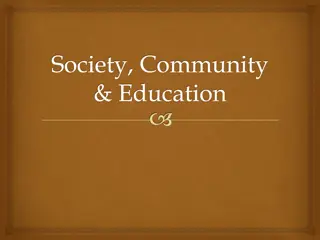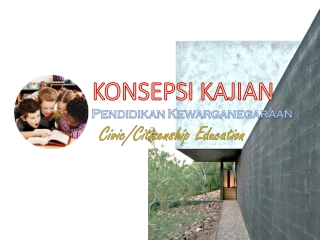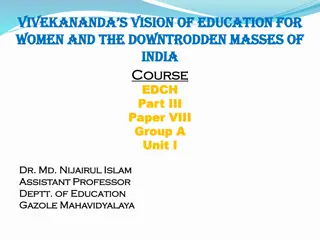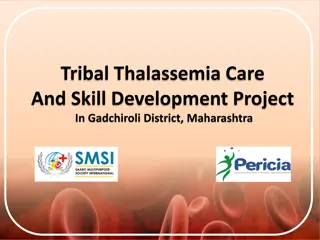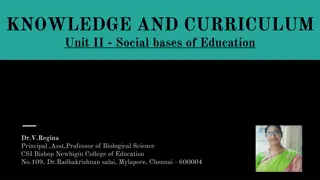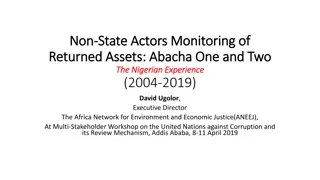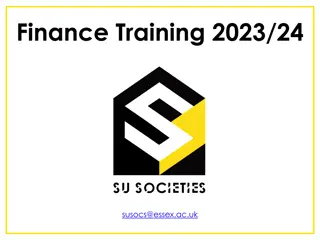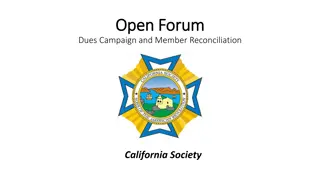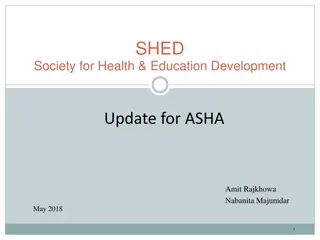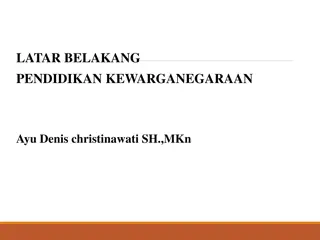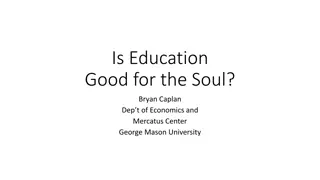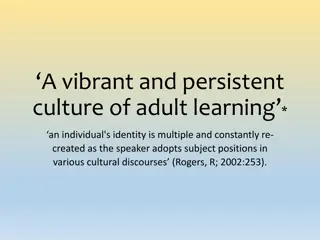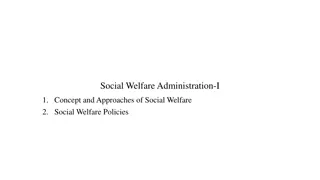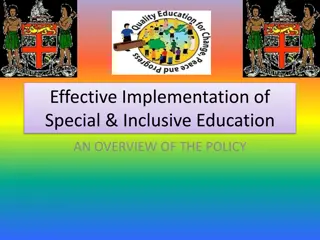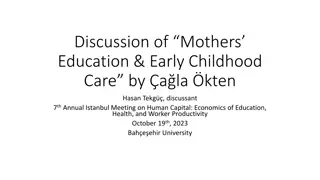The Importance of Education in Society
Education is a fundamental human right that should be accessible to all individuals regardless of background. It plays a crucial role in shaping individuals, communities, and nations. Government programs and initiatives such as the K-12 program aim to provide equitable education opportunities for all, emphasizing the significance of lifelong learning and skill development. Through education, individuals can achieve personal growth, contribute to society, and enhance overall well-being.
Download Presentation

Please find below an Image/Link to download the presentation.
The content on the website is provided AS IS for your information and personal use only. It may not be sold, licensed, or shared on other websites without obtaining consent from the author. Download presentation by click this link. If you encounter any issues during the download, it is possible that the publisher has removed the file from their server.
E N D
Presentation Transcript
TUNGO SA BAYANG MAGILIW - 10 Ang Kahalagahan ng Edukasyon 1 i-Pantawid eFDS 10
eFDS10 Ang Kahalagahan ng Edukasyon 1. Education rights Mga karapatan sa edukasyon 2. Government programs Mga programa ng gobyerno ukol sa edukasyon 3. Responsibilities of Pantawid members Mga tungkulin ng miyembro ng Pantawid 4. Community Scorecard (CSC) 2 i-Pantawid eFDS 10
UDHR Article 26 Everyone has the right to education. Education shall be free, at least in the elementary and fundamental stages. Elementary education shall be compulsory. Technical and professional education shall be made generally available and higher education shall be equally accessible to all on the basis of merit. Ang bawat tao'y may karapatan sa edukasyon. Ang edukasyon ay walang bayad, doon man lamang sa elementarya at pangunahing antas. Ang edukasyong elementarya ay magiging sapilitan. Ang edukasyong teknikal at propesyonal ay gagawing maabot ng lahat at ang lalong mataas na edukasyon ay ipagkakaloob nang pantay-pantay sa lahat batay sa pagiging karapat-dapat. i-Pantawid eFDS 10 3
Millenium Development Goal #2 K-12 Program (see next slide) Republic Act No. 10157 approved on January 20, 2012 otherwise known as An Act Institutionalizing the Kindergarten Education Into the Basic Education System and Appropriating Funds Therefore Abot Alam Program - to locate the out-of-school youth (OSY) nationwide who are 15 to 30 years old and who have not completed basic/higher education or who are unemployed, and to mobilize and harmonize programs which will address these OSYs needs and aspirations Early Registration Day (January) Alternative Learning System (ALS) i-Pantawid eFDS 10 4
K - 12 Naninindigan pa rin po tayo sa ipinangako nating pagbabago sa edukasyon: ang gawin itong sentral na estratehiya sa pamumuhunan sa pinakamahalaga nating yaman: ang mamamayang Pilipino. Sa K to 12, tiwala tayong mabibigyang-lakas si Juan dela Cruz upang mapaunlad hindi lamang ang kanyang sarili at pamilya kundi maging ang buong bansa. Pangulong Benigno S. Aquino III 5 i-Pantawid eFDS 10
The K to 12 Program covers Kindergarten and 12 years of basic education (six years of primary education, four years of Junior High School, and two years of Senior High School]) to provide sufficient time for mastery of concepts and skills, develop lifelong learners, and prepare graduates for tertiary education, middle-level skills development, employment, and entrepreneurship. 6 i-Pantawid eFDS 10
DepEd Order No. 21, Series of 2012 7 i-Pantawid eFDS 10
DepEd Order No. 21, Series of 2012 c. The Parents-Teachers Association (PTA) may collect contributions starting August 2012 only after presenting to their members and to the school head/principal a Report on the Utilization of the Previous School Year s Collections and the SY 2012 Proposed Budget with Program of Activities taking into account the following: i. The amount of contributions to the PTA shall be agreed upon during the General Assembly pursuant to DepEd Order No. 54, s. 2009; and shall be concurred in by the school head/principal. (The concurrence of the school head/ principal on the amount of voluntary school contributions shall not be interpreted to mean that the contributions are mandatory). ii. The PTAs are enjoined to refrain from setting exorbitant amounts for voluntary school contributions. In consideration of the many expenses that parents incur in sending their children to school, the PTAs are encouraged to minimize the amount of contributions for graduation ceremonies and extra- curricular activities as well as minimize requests for in-kind contributions. iii. The contributions to the PTA shall be on a per member basis, regardless of the number of children that the member has enrolled in the school; iv. The PTAs are encouraged to open and maintain a bank account to manage its collections and budget; and v. The Division PTA Affairs Committee shall strictly monitor the activities of the PTAs and their compliance with reports and other requirements. i-Pantawid eFDS 10 8
DepEd Order No. 21, Series of 2012 d. The publication of the school newspaper, although not mandatory, is strongly encouraged in line with the promotion of the campus journalism program at the elementary and secondary levels. The school publication fee shall be set at the school level. Elementary pupil shall not pay more than Sixty Pesos (PhP60.00), and high school student, Ninety Pesos (PhP90.00) per DepED Order No. 19, s. 2008. e. No teacher, school official nor school personnel shall collect fees or contributions, nor shall they be entrusted with the safekeeping and disbursement of collections made by the PTA pursuant to the Code of Ethics for Professional Teachers (as provided for in Article XI of Republic Act. No. 7836). Teachers shall not act, directly or indirectly, as agent of any commercial venture, nor shall they be financially interested, of which they can exercise official influence. Hence, teachers, school officials and school personnel are prohibited from selling or requiring the purchase of locally- produced workbooks, instructional materials, test booklets, school supplies and other items; f. The membership fees for student/pupil organizations shall be set by the organization subject to existing school policies on student organizations. g. If the collection of school publication fees and other club memberships are coursed through the PTA as requested by the concerned organization, the amount collected shall immediately be remitted to the school or organization on the day of collection. No service fee shall be charged to the school or pupil/student organization by the PTA. h. It is stressed that in no case shall non-payment of voluntary school contributions or membership fees be made a basis for non-admission, non-promotion or non-issuance of clearance to a student by the school concerned. i. Non-compliance with the provisions of this DepEd Order shall be a ground for cancellation of the PTA s recognition and/ or filing of appropriate charges as the case may be. 9 i-Pantawid eFDS 10
DepEd Order No. 21, Series of 2012 3. The implementing policies on enrolment to be strictly observed are as follows: a. During the opening of classes, the school heads (SHs)/principals shall ensure that Grade 1 pupils and First Year High School (Grade 7) students who registered on January 28, 2012 are in school. In cases when there are no schools in the area, the mobile learning facilitator of the Alternative Learning System (ALS) shall provide educational services to these learners; b. Grade 1 pupils shall be six (6) years old by October 2012. The certification of birth from the local civil registrar shall be the documentary basis for enrolment and shall be submitted on or before December 2012; c. Children who are younger than six (6) years old by six (6) months may be admitted to Grade 1 provided that their readiness for school has been assessed (with positive results) by the school where they are applying for admission through the School Readiness Assessment Tool in relation to DepEd Order No. 25, s. 2007; d. All Grade 1 pupils and First Year High School (Grade 7) students who did not register on January 28, 2012 need to enroll before or during the opening of classes; e. Pupils or students who are promoted to the next grade or year level are considered automatically enrolled for the coming school year (2012- 2013) in the same school; f. Pupils or students who wish to transfer to a public school from another public school or from a private school shall bring their Form 138 (Report Card) to the school where they intend to transfer. If this document is not available, the child can be admitted on the condition that the Report Card shall be submitted not later than the end of the First Grading Period; g. The class size shall range from a minimum of 15 pupils/students to a maximum of 60 pupils/students per class for Grade 5 to high school. Whenever possible, classes in Grades 1 to 4 shall not exceed 40 pupils per class in order to keep the teaching-learning process more manageable during these foundation years of schooling; h. The specific provision of DepED Order No. 32, s. 2003 which gives priority preference for admission to new entrants who are residents of the locality where the school is located subject to the average and maximum class size stated in Item 3. g, is maintained. However, excess entrants (new or old), who are residents of the locality where the school is located shall be admitted, subject to the provisions of the succeeding paragraph; i. In schools where there are oversized classes, school heads / principals shall utilize alternative delivery modes such as the modified In-School Off-School (MISOSA), Instructional Management by Parents, Community and Teachers (E- Impact), Drop-Out Reduction Program (DORP) print modules, e-modules, and Computer-Assisted Instruction (CAI) among others; j. The most qualified and/or the most experienced teachers shall be assigned to run the alternative delivery modes; and k. The provision on the Adoption of Double Shift Policy to address classroom shortages, as provided for in DepED Order No. 62, s. 2004, subject to the above cited average and maximum class size, shall be maintained. 10 i-Pantawid eFDS 10
DepEd Order No. 21, Series of 2012 4. The implementing guidelines on the wearing of student uniform and identification (ID) cards are the following: a. The wearing of a school uniform shall not be required in public schools. Students with existing uniforms may continue using these uniforms, if they so desire, in order to avoid incurring additional costs for new attire; and b. ID cards shall be provided to students at no cost on their part. The school head/principal shall fund these ID cards from its Maintenance and Other Operating Expenses (MOOE). 5. The policies on the distribution of instructional materials such as textbooks and other learning resources are as follows: a. The school head/principal shall ensure that textbooks and learning packages available in the school shall be distributed to all the pupils or students. Reading materials in the library hubs shall be maximized for instruction; and b. Teachers in schools with Information and Communication Technology (ICT) equipment and materials shall utilize these for multiple delivery formats such as large group workshops, small group discussions, and individualized instruction to develop self-directed learning. 11 i-Pantawid eFDS 10
DepEd Order No. 21, Series of 2012 8. All DepEd issuances pertaining to collection of fees or contributions on voluntary basis consistent with this DepEd Order are hereby reiterated, and strictly enforced. Any violation of this Order by any teacher, school official or school personnel shall be dealt with administratively, pursuant to DepEd Order No. 49, s. 2006, otherwise known as the Revised Rules of Procedure of the Department of Education in Administrative Cases. 9. All previous issuances which are inconsistent with the provisions of this DepEd Order are hereby repealed or modified accordingly. 10. These guidelines shall remain in force and in effect during the succeeding school years until revised or repealed. 12 i-Pantawid eFDS 10
Mga Kondisyon upang makamit ang BENEPISYO Pumapasok sa Day Care o pre-school at may attendance na di bababa sa 85% kada buwan Pumapasok sa elementarya o high school at may attendance na di bababa sa 85% kada buwan i-Pantawid eFDS 10 13
Community Scorecard (CSC) A participatory, community-based monitoring and evaluation tool Pamamaraan para makilahok sa pamamahala at pagsusuri That enables citizens to assess the quality of public services such as a health center, school, public transport, water, waste disposal systems, etc., seeking areas for improvement Pagsusuri ng kalidad ng serbisyo publiko kagaya ng para sa kalusugan, edukasyon, transportasyon, patubig, atbp. para mapabuti o mapaganda ito 14 i-Pantawid eFDS 10
Proseso ng Community Scorecard (CSC) 1. The CSC informs community members about Paguusapan ang available services in the community serbisyo publiko their entitlements to these services karapatan natin ukol sa serbisyo publiko 2. The CSC asks for users direct feedback about the quality, efficiency, and accessibility of these services Nagtatanong tungkol sa kalidad, husay at pagkarating ng serbisyo publiko, sa pagbibigay ng score 15 i-Pantawid eFDS 10
Proseso ng Community Scorecard (CSC) 3. Those providing the public service also rate their performance Ang tagapamahala sa serbisyo publiko ay nagbibigay alam din tungkol sa kalidad, husay at pagkarating ng kanilang serbisyo publiko 4. The service providers and their clients sit down and discuss the scorecard results and how to improve these Ang tagapamahala sa serbisyo publiko at ang tumatanggap ng serbisyo ay nakikipa-ugnayan tungkol sa resulta at paano mapaganda pa ang serbisyo publiko ---Interface Meeting--- 16 i-Pantawid eFDS 10
Education Services Community Scorecard We will review the education services provided by the school on specific attributes Susuriin natin ang tungkol sa serbisyong edukasyon ng mga paaralan ng ating mga anak For each attribute, we will assign a score Magbibigay tugon sa bawat katangian Indicate reasons for the rating Maglagay ng detalya kung bakit ganun ang ibinigay na puntos at mga mungkahi para mapabuti ang puntos i-Pantawid eFDS 10 17
Form TPM 8-V3. Education Services Scorecard Objective: To assess 4Ps members satisfaction with the specific education services and facilities as basis for engaging the education service providers. Responsibility for filling out: Assigned local CSO staff. Data source: All members attending the eFDS (1 rating per group) and the Education Service Providers (1 rating per school by principal or 4P s Focal Person). When to fill out: This will be filled out on the 6th or 7th Month of i-Pantawid implementation for Batch 3 LGUs (please see schedule matrix). Barangay: City/Municipality: Type of Facility: (check one) Day care Elementary High School Data source (check one): All beneficiaries Members Service Provider Name & signature of CSO staff in charge of this form: Province: Date prepared: 18 i-Pantawid eFDS 10
[Encircle only one answer.] Areas to be Rated 12 3 4 Reasons for Rating (in bullet form) Suggested Improvements (in bullet form) 1. School fees/contributions (Miscellaneous) 2. Treatment of students (Teacher-Student relationship) 3. Accessibility of teacher (Teacher-Parents relationship) 4. Availability of functional basic facilities (table, chair, electric fans, etc.) 5. Availability of textbooks/children s books 6. Availability of functional learning laboratory facilities - Computers - Audio visual equipment (TV, DVD player, etc.) 7. Availability of First Aid Medicines and Medical Personnel 8. Functional amenities (drinking water, toilets, water for toilets, electricity) 9. Availability and condition of school canteen 10. Availability of healthy food in the school canteen 11. Adequacy of school rooms 12. Safety of the students - Presence of security personnel - Presence of security fences 13. Overall school services and facilities 1 2 3 4 1 2 3 4 1 2 3 4 1 2 3 4 1 2 3 4 1 2 3 4 1 2 3 4 1 2 3 4 1 2 3 4 1 2 3 4 1 2 3 4 1 2 3 4 19 1 2 3 4 i-Pantawid eFDS 10
A child without education is like a bird without wings. Tibetan proverb Ang batang walang pinag-aralan ay parang ibong walang pakpak. 20 i-Pantawid eFDS 10





